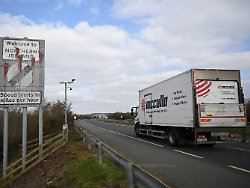Sunday, September 5th, 2021
Hard Brexit consequences
The British are suffering from a shortage of truck drivers
A mixture of the corona pandemic and Brexit is paralyzing the British economy: there are too few truck drivers. Shelves in supermarkets remain empty – and the government is calling for wages to be raised.
Laurence Bolton stands in front of his driving school in south London and is amazed. Two jumbo pilots on leave and a banker with burnout are among his learner drivers and are learning how to maneuver a 44-ton truck through the streets. For Bolton, applicants from such industries are real news. “I get students from all industries, that wasn’t the case before 2020,” he says. The rush has a serious background for the British economy: there is a dramatic shortage of truck drivers on the island after Brexit and the Corona crisis.
Haulage companies are desperately looking for truck drivers, many lure with higher wages or bonus payments for novices behind the wheel. At Bolton, the number of learner drivers has increased by 20 percent. But that’s not enough: 100,000 additional drivers would be needed to reliably get goods over the streets, calculates the industry association RHA. If that doesn’t change, prices could rise and inflation fuel.
Truck drivers are also rare in Germany. The industry association BGL assumes 45,000 to 60,000 missing drivers, says its board spokesman Dirk Engelhardt. Around 30,000 truck drivers also retired each year, but in recent years only between 15,000 and 20,000 truck driver’s licenses have been acquired each year. This would make the gap even bigger. The working conditions would have to become more attractive in order to remedy this.
Brexit drives out EU citizens
But a special factor comes into play on the island: After Brexit, around 20,000 drivers from EU countries will be missing, according to data from the industry association there. In addition, many driving schools had to temporarily close their doors to contain the pandemic. In normal years, around 40,000 people pass the driving test for trucks, but this number fell by two thirds during the Covid crisis. And that could also have consequences at Christmas, fears RHA representative Rod McKenzie. “The British are not going to get the things they want.”
And the closer the holidays approached, the more the situation will worsen with increasing quantities of goods. Consumers ordered online and expected delivery the next day. But the logisticians were often unable to do this in view of the driver shortage. There have already been appeals from trade and logistics to be able to hire drivers from EU countries again, because the snack chains McDonald’s and Nando’s were already experiencing problems in the supply chains. The calls for help met with rejection from the government in London. Rather, the companies should raise wages and improve working conditions, it said there.
The driver shortage has already caused wages to rise, for newcomers they rose by 5.7 percent between February and July, says Jack Kennedy, an economist at the online recruiter Indeed. In the past, unions had repeatedly criticized low wages and difficult working conditions for drivers. In 2020, a driver cashed an average of around 11.80 pounds (about 13.50 euros) an hour.
The development could even be of interest to the British central bank. Because the shortage and the wage development in the industry could be a signal for wage increases in other professions, which picked up only weakly after the financial crisis in 2008. There have already been warnings from industry that delays in deliveries are holding back production and driving up costs. The Bank of England expects an inflation rate of four percent in 2021, which would correspond to a ten-year high.
.
